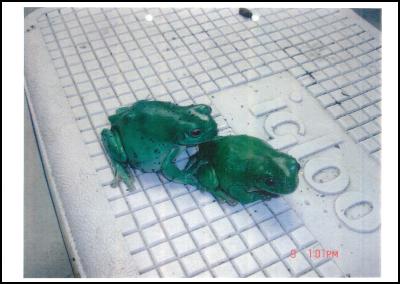Frog Fine

Haisley Pace, a collector and breeder of frogs and lizards, was discharged without conviction but ordered to pay investigation and court costs totalling $10,000.00, after his court appearance last Friday.
Mr Pace was charged under the Biosecurity Act 1993 after Ministry of Agriculture and Forestry (MAF) officials received information from a member of the public that suspected White’s Tree Frogs were being advertised for sale online.
A MAF investigation confirmed the identity of the frogs and a search warrant was issued at Mr Pace’s home to locate the frogs and find out more about their importation. Investigators found an adult pair of White’s Tree Frogs onsite, a number of juvenile frogs, and confirmed that none had been sold or ever left the property.
When interviewed, the defendant admitted he had suspected the frogs were unathorised goods and couldn’t provide any detail about their importation. To date, MAF has not been able to specifically determine their source.
White’s Tree Frogs are a species commonly found in Australia and were introduced to New Zealand in the late 19th century. There was, however, never evidence that any survived. Although the frogs are known to sometimes reach New Zealand they have never been able to naturalise and there are no known wild populations of the frog.
MAF Enforcement Director Jockey Jensen said the result illustrates how seriously New Zealand takes biosecurity.
“Importing and illegally possessing risk goods like this increase New Zealand’s exposure to potential impacts on our environment, health and biodiversity”.
“If we are going to protect this country’s unique biodiversity we must all be vigilant about preventing unwelcome imports that may carry a risk of introducing a pest or disease into the country and ensuring we report anything unusual.”
All imports of pests and animals must be cleared by MAF. Clearance is necessary to protect against the introduction of unwanted pests and diseases that could seriously affect New Zealand’s environment. Exotic animals may contain dangerous diseases and many viral diseases are transmittable through the movement of exotic pets.
ENDS


 WorkSafe NZ: Worker’s Six-Metre Fall Prompts Industry Call-Out
WorkSafe NZ: Worker’s Six-Metre Fall Prompts Industry Call-Out PSGR: Has MBIE Short-Circuited Good Process In Recent Government Reforms?
PSGR: Has MBIE Short-Circuited Good Process In Recent Government Reforms? The Reserve Bank of New Zealand: RBNZ’s Five Year Funding Agreement Published
The Reserve Bank of New Zealand: RBNZ’s Five Year Funding Agreement Published Lodg: Veteran Founders Disrupting Sole-Trader Accounting in NZ
Lodg: Veteran Founders Disrupting Sole-Trader Accounting in NZ New Zealand Airports Association: Airports Welcome Tourism Marketing Turbocharge
New Zealand Airports Association: Airports Welcome Tourism Marketing Turbocharge Ipsos: New Zealanders Are Still Finding It Tough Financially; Little Reprieve Expected In The Next 12 Months
Ipsos: New Zealanders Are Still Finding It Tough Financially; Little Reprieve Expected In The Next 12 Months



